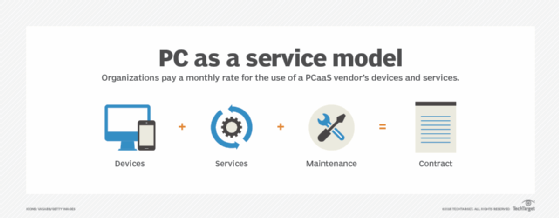What is PC as a service (PCaaS)?
PC as a service (PCaaS) is a device lifecycle management model in which an organization pays a monthly subscription fee to lease endpoint devices (PCs) and management services from a vendor instead of purchasing them outright. PC as a service aims to simplify PC lifecycle management, including purchasing, managing, retiring and refreshing PCs.
Why adopt a PCaaS model
The PCaaS model removes the need for organizations to worry about the various aspects of hardware lifecycle management, including device purchases, maintenance, updates, upgrades, end of life (EOL) and replacements. Instead, the PCaaS provider handles all those tasks, reducing the burden on IT teams and leaving them free to focus on other strategic tasks that might be more beneficial to the organization.
Hardware costs are part of an organization's capital expenditures (Capex). PCaaS follows an operational expenditure (Opex) model in which an organization pays a monthly rate to use a vendor's devices and services instead of purchasing those devices and services outright. In effect, PCaaS allows businesses to convert hefty and hard-to-manage Capex into more manageable and controllable Opex. By doing so, they can save on the costs of purchasing hardware, which might help to free up capital for more important business investments.
The subscription-based PCaaS model is scalable so organizations can choose the devices and services they need as per current requirements. If the requirements change, they can choose different devices and services. Such flexibility ensures that their hardware investments remain aligned with evolving business needs. It also removes the costs and eliminates the maintenance burdens associated with unnecessary, underperforming or obsolete assets.
This article is part of
What is desktop management and how does it work?
The best PCaaS vendors proactively maintain and update their devices. Some also monitor devices to implement preventive maintenance and address issues early. This helps minimize breakdowns and costly downtime events.
Organizations should consider adopting a PCaaS model if they are looking to do the following:
- Improve the predictability and controllability of IT expenses.
- Access the required type and number of hardware resources at any time to continuously satisfy business requirements.
- Eliminate the need to manage device lifecycles from start (purchase) to end (EOL).
- Reduce downtime due to unexpected device breakdowns.
Main elements of a PCaaS offering
The components of a PCaaS offering typically include the following:
- Devices. The PCaaS vendor provides the personal computers needed by the customer organization. The customer can add or remove devices per their needs, and the vendor will accordingly adjust the cost.
- Services. Many providers offer IT helpdesk support, lifecycle management, security and other services to maximize the value of the PCaaS contract for the customer. These services might be included in the contract or offered as value-added services.
- Maintenance. PCaaS frequently follows the managed services model. As a result, device maintenance and upgrades are often part of the contract.

The vendor's PCaaS offerings might also include configuration, data backup and recovery, and asset management services. Additionally, they might include predictive analytics that can anticipate potential hardware failures and thus proactively combat possible downtime situations. Some vendors monitor security policy violations on their devices, maintain device inventories and track device locations and status. Such services can help boost security and safeguard the devices (and data) from cyberattacks and data breaches.
As with other device-as-a-service models, IT can pick the PCaaS contract that best meets their needs. The contract can range from a fully managed arrangement where the vendor controls everything to a hybrid approach where the internal IT department manages some aspects of the device deployment and ongoing operations.
Key benefits of PCaaS
There are several benefits to using the PCaaS model versus traditional device purchase and management processes.
The model converts IT expenditures from Capex to Opex. Instead of purchasing PCs outright and thus incurring IT expenses, companies can simply lease the PCs they need from a PCaaS vendor. Rather than making a large upfront investment in hardware, they can pay a monthly fee for a hardware subscription. Leasing using subscriptions is usually much cheaper than purchasing, which makes PCaaS particularly useful for organizations with limited IT budgets.
Additionally, the vendor takes care of device configurations, maintenance, lifecycle management, upgrades, security and other tasks. This also enables firms to simplify IT management, reduce IT costs and avoid adding IT staff. Also, if the contract with the PCaaS vendor includes maintenance and other services, the company can cancel an existing service contract purchased through a reseller. This can further decrease costs.
PCaaS can help organizations easily scale their device landscape up or down in a very agile manner. For example, if more PCs are needed for a specific period or project, the IT department can lease more devices from the vendor. If the workforce is downsized, the firm can simply reduce the number of devices leased from the vendor rather than being left with a surplus of devices it doesn't need. It's worth noting that the lease might lock an organization into leasing devices for a specific amount of time, so cost savings might be limited.
In some cases, the PCaaS model might make it easier for organizations to keep pace with changing technology. Rather than being stuck with older, outdated or obsolete PCs they no longer need, organizations can get more updated hardware from the vendor at the end of the lease.
Another benefit of PCaaS is that it shifts device lifecycle management responsibilities and device maintenance and repairs from in-house IT teams to the PCaaS vendor. Offloading these responsibilities can free up time for IT teams so they can focus on more essential tasks.
Main drawbacks of PCaaS
Notwithstanding its benefits, the PCaaS model has some drawbacks. The main drawbacks are similar to those associated with some other as-a-service models.
One drawback is that the organization never owns the PC hardware. Instead, it pays a fee, usually monthly, for perpetuity (or as long as they continue to use the PCs). This model might work for some organizations. But for those that prefer to make outright purchases and own the resources, the long-term financial obligation associated with PCaaS might not be feasible or acceptable.
Another drawback is that the subscription price and related fees paid throughout the lease might be higher than what the buyer would have paid by purchasing the PCs outright.
The provider's customization options, support and maintenance services determine the customer's PCaaS experience. If the services are not up to par, the organization might incur higher costs and inconvenience. Further, limited customization can be an issue if the company needs a specialized setup for certain processes or projects.
Finally, data security can be a concern for PCaaS buyers. If the PCaaS provider has not implemented strong security controls, the organization is at higher risk of cyberattacks that might result in data losses, downtime and regulatory penalties.
How to choose a PCaaS provider
Many companies provide PCs on cost-effective leases. However, it's not enough to select a vendor on this basis alone. It's also important to assess the services and support provided by the vendor. The selected vendor should provide a holistic PCaaS product that effectively matches the organization's IT needs and business goals. That said, companies should do a detailed analysis of their needs to guide their vendor assessments.
An evaluation of every vendor's device portfolio and customization options is also important. This can help buyers identify the right vendor and PCs before they arrive on their premises. It will also speed up deployment and reduce the need for costly tweaks or changes.
The chosen provider should have a good reputation. To gauge their standing, it's useful to check references from their other customers and to ask them about their experiences with the vendor. The provider should also be flexible and agile to ensure that the company can easily scale up or down. Customers should be able to quickly add new PCs if the need arises or remove some PCs if there is no longer a need. To this end, the subscription model must allow for such changes without penalizing the organization.
Companies should review the vendor's service-level agreement (SLA) before signing the PCaaS contract. It is possible that the SLA might not match the business's needs, with respect to the timelines for device replacements or predictive maintenance, uptime guarantees, support response times, etc. It's crucial to be aware of these details to prevent future problems and to avoid burdening the in-house IT team.
A reliable provider will ensure that their PCs are secure. They should incorporate strong security features in each PC, such as data encryption, biometric authentication and software patching. Additionally, they should implement protocols for data wiping and asset recovery on retiring devices to prevent inadvertent data losses or leaks.
Finally, the buyer must fully understand the cost of the PCaaS subscription, including any hidden fees, early contract termination fees and the cost of additional/value-added services. If the monthly subscription cost or total cost of ownership (TCO) is likely to be higher than an upfront purchase of PCs, it might not be inadvisable to purchase a subscription from the vendor.
Top PCaaS vendors
Dell, HPE, Lenovo and Microsoft are among the major vendors in the PCaaS market.
Dell's PCaaS packages include Dell business laptops, desktops and workstations, as well as software, PC lifecycle services, managed services, asset recovery and security. It is worth noting that the term PC as a service is becoming less commonly used among vendors. Instead, many vendors are adopting the term device as a service (DaaS). HP is an example, with DaaS offerings that include desktops, workstations, notebooks, mobile devices, plus device lifecycle management and repair services.
Lenovo's TruScale DaaS program includes digital workplace solutions aimed at helping companies reduce IT costs compared to traditional procurement models. Firms can access a range of hardware, software and services on a subscription basis to optimize their IT mix and costs.
Microsoft offers DaaS through its Azure Virtual Desktop product and Windows 365 platform. Azure Virtual Desktop is a cloud virtual desktop infrastructure (VDI) offering that allows users to remotely access virtualized Windows 10 or 11 desktops and apps. Windows 365 enables businesses to easily configure and deploy cloud PCs and deliver Windows experiences to employees from any device.
PCaaS vs. DaaS
PCaaS and DaaS are very similar. The main difference is that PCaaS revolves solely around PCs, while DaaS often encompasses a variety of device types such as PCs, tablets, mobile devices and sometimes even specialized equipment.
Both PCaaS and DaaS are about more than just providing physical devices. With PCaaS packages, DaaS products often include lifecycle management, updates, security, maintenance and support. That said, PCaaS has a smaller scope with its sole focus on computing devices. In contrast, DaaS has a wider scope because the vendor takes responsibility for providing and managing the customer organization's broader device ecosystem.
Both are subscription services, but while PCaaS involves leasing physical hardware, DaaS is a purely virtual model in which organizations lease virtual desktops hosted in the cloud. These cloud-based virtual machines (VMs) usually run desktop OSes such as Windows 10 or Windows 11 and various desktop applications.
Finally, there can be big pricing differences between PCaaS and DaaS. PCaaS pricing is usually based on a single type of device. DaaS contracts and SLAs are usually more complex due to the greater variety of devices that are provided and managed.
Organizations participating in a PCaaS agreement will incur monthly fees, but the advantages they gain, such as lifecycle management and support, offer significant value. Learn more about the benefits of the PCaaS model. Also, explore best practices for a PC end-of-life policy as well as how to maximize PC lifespans with effective PC lifecycle management and build a plan for PC and desktop lifecycle management.






